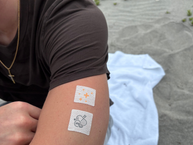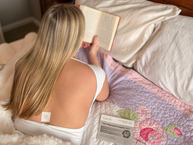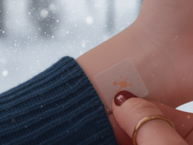When you see people with beautiful skin, do you wonder what their secret is? Do you wonder whether you could have glowing skin like them?
There is some luck involved in how your skin looks, but there is a lot that you can do to impact your skin’s appearance and health. There is more good news: you can improve skin health without a lot of expensive products. Here are 10 steps you can take to get skin that looks healthier.
Wear sunscreen.
Sunscreen can block harmful UVA and UVB radiation from the sun. To get maximal effects, it is best to apply sunscreen to exposed areas of the skin before going outside. Look for a zinc oxide-based, broad-spectrum sunscreen with SPF of at least 30.
Meet your skin’s needs.
This may sound obvious, but here’s the thing: you can get better results by working towards what your skin needs than by thinking about what the popular products are. For example, if your skin is dry, use a moisturizer. If your skin is oily, use a product designed for oily skin. Your skin type and needs depend on genetics and environmental factors and may change during different periods of your life.
Manage stress.
Excessive stress can lead to the appearance of conditions such as psoriasis and eczema in people who have not had them before. If you already have these conditions, too much stress can also cause flare-ups of symptoms. Acne and rosacea can also become worse during periods of stress.
These are some ways to manage stress.
- Exercise regularly.
- Try relaxation exercises such as deep breathing or progressive muscle relaxation.
- Make a to-do list and prioritize items on it.
- Be social.
A mental health professional is the best person to help you manage stress. Ask a healthcare provider if you have concerns about too much stress.
Wash your hands and face frequently.
Washing your hands frequently can help stop the spread of germs so you lower the chances of getting sick, and it also helps stop you from touching your face with dirty face. Washing your face often can remove extra oils.
It is good to wash your hands whenever you come inside, when you get them dirty, before and after eating, and after using the bathroom. Sweat can make your face break out, so it is good to wash your face after exercising or being in hot weather. Washing your face in the morning and before going to bed can also help your skin look healthier.
Use tried-and-true soap and water.
In most cases, an inexpensive cleanser can do the job better than a more expensive product. Some products are rough on the skin or contain chemicals that you may not want to use. Mild soap and warm water can be a good pair.
Be gentle with your skin.
Washing your face often is a good way to keep it clean, but the temptation may be to scrub it hard. That can be harmful to your skin. Instead, be gentle when washing yourself. A soft sponge or washcloth can work for your body. For your face, use your fingertips in a circular motion on your face, and then rinse.
Wash your towel often.
Yes, it needs to be said. A clean towel is essential for optimal skin health. Bacteria can grow on towels when you dry yourself with them. Damp towels can allow germs to grow. When you wipe your face on a contaminated towel, your skin may break out. A clean, dry washcloth or towel is best for your face and the rest of your body.
Eat healthy.
What you eat can affect skin health. Luckily, the same sorts of nourishing foods that are good for the rest of your body are usually good for your skin. That is, enjoy plenty of fruits, vegetables, nuts, fish, beans, and whole grains to support healthy-looking skin. At the same time, less healthy foods, such as processed foods, fried foods, and desserts, may lead to your skin looking less glowing and smooth.
See a dermatologist.
A dermatologist is a medical doctor with additional training in skin health. In other words, dermatologists are skin experts. You might be referred to one if your primary care doctor sees something that looks unhealthy on your skin. Dermatologists can help assess spots on your skin and remove them if necessary.
Dermatologists can also help with other concerns. For example, they may be able to recommend skincare products that are designed to specifically meet your skin’s needs. Or, they can show you good practices for washing.
Use a vitamin patch.
Just like other parts of your body, your skin needs certain nutrients to be at its best. They are found in foods, but even the healthiest of diets can be lacking in some essential vitamins and minerals on some days. A supplement can contain vitamins and minerals that are not in your daily diet.
The Biotin Patch for Hair, Skin, and Nails by PatchAid has biotin along with antioxidant vitamins A, C, and E, vitamin D, selenium, zinc, and vitamin K. Each of these is required for healthy skin, whether directly or indirectly.* For example, vitamin A is known as a compound that may reduce acne symptoms*, and vitamin K can help with healthy blood function, which is necessary for maintaining healthy skin.*
In addition to these essential vitamins and minerals, the Biotin Patch for Hair, Skin, and Nails by PatchAid has a proprietary blend of herbal and other ingredients, such as curcumin, cinnamon, and alpha-lipoic acid. It also includes collagen, as well as a building block of collagen: glucosamine. Collagen is in healthy skin and is responsible for its elasticity.
The Biotin Patch for Hair, Skin, and Nails by PatchAid is easy to use and is free from latex, gluten, and sugar. Just be sure to talk to your healthcare provider before using any nutritional supplement. Take care of your skin, and see how it rewards you for your care by looking more amazing than ever.
*The Food and Drug Administration has not evaluated these statements. PatchAid patches are not intended to diagnose, treat, cure or prevent any disease. Anyone with a medical condition should seek the advice of a licensed medical practitioner. Individual results may vary.







